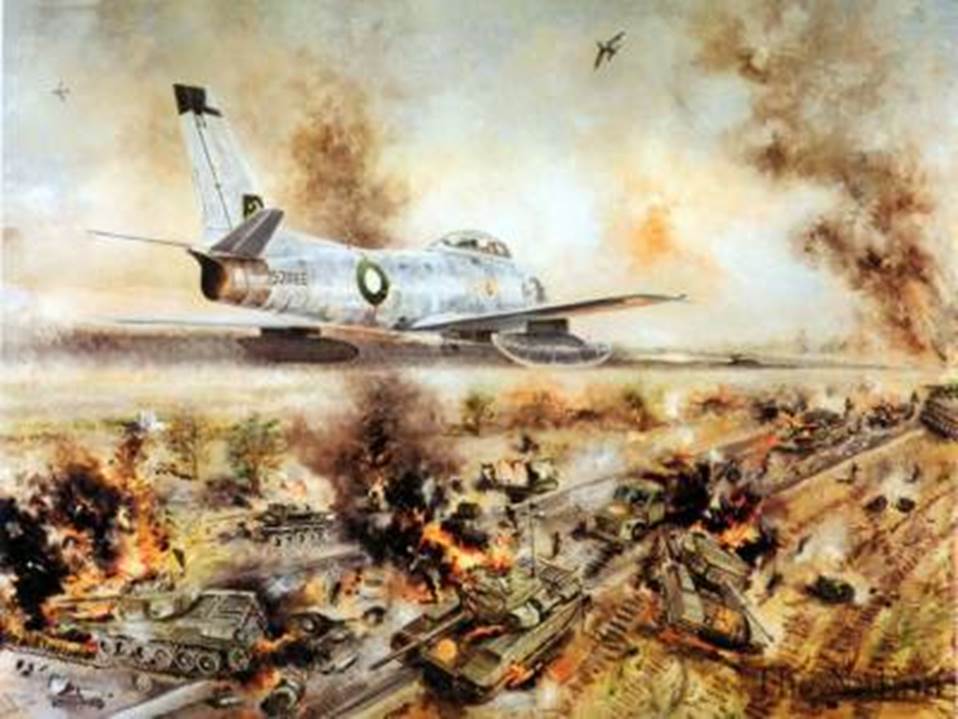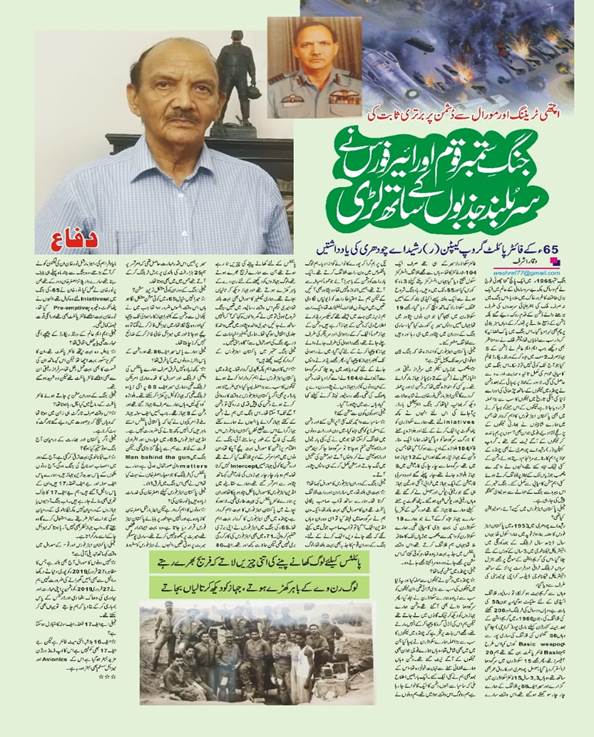

1965 Pakistan-India War: Three AAAs that saved Pakistan – ALLAH, Artillery, and the Air Force
How Pakistani Pilots Successfully Blunted the Attack on Chawinda in September 1965
By C. Naseer Ahmad
Washington, DC

For fifty-eight years, since the fateful day on September 6, 1965, the Defense Day – known as ‘Youm-e-Difa’ – has been celebrated with flag hoisting, military parade, and speeches. This was the day when Indian military crossed the international border.
With each passing year the number of people who can give their account of what really happened decreases either because they are now deceased or don’t possess the mental faculties to give a cogent description of events. Accounts from personal experiences provide a much clearer version of how things were going in those days, as opposed to the official version which carries the risk presenting false narratives or sheer propaganda.
An account given by late Pakistan Air Force Group Captain Rashid A. Chaudhry, to journalist Waqar Ashraf for Nawai Waqt – Family Magazine in Urdu, a few years before his death provides a better insight for the layman to understand the stakes involved at a moment of great national peril. The refreshing thing about the interview is that Group Rashid A. Chaudhry was neither trying to settle scores with his superiors and/or juniors nor committing narcissism. Instead, he stuck to facts and the role he played.

While the official truth sold to the nation was that India committed an unprovoked attack on Pakistan on September 6, 1965, in reality military hostilities between the two countries had been going on much earlier in Kashmir. Historians and military leaders have had their say by writing books or opinion pieces, which carry more weight if biases or half-truths are left out.
To blunt Pakistani Army’s advantageous positions around Akhnur, India wanted to break Pakistani supply lines and cut-off Lahore from Sialkot and other strategic points. The battle of Chawinda became the major engagement of Indian and Pakistani armies. Pakistan Air Force was tasked to support Pakistan Army in denying India the capture of Chawinda.
Despite numerical superiority, India was unable to achieve the prize of capturing Chawinda. In addition to the bravery of the foot soldiers on the battlefields near Chawinda, it was the performance of the Pakistan Air Force that helped stave off the enemy. Fighter pilot M.M. Alam was perhaps the most well-known for having shot down several Indian Airforce planes within a minute. There were many of his compatriots like Group Captain Rashid A. Chaudhry who flew so many missions firing upon enemy forces and slowing down their advance.
“The morale was very high amongst the pilots,” recalled Group Captain Rashid A. Chaudhry. “Every one of the pilots would say, ‘please let me go on this mission,’ ” he recalled. “After returning from each mission, we would be received by thunderous applause of fellow citizens who had gathered around the air force bases,” he added.
When asked about the success factors, Group Captain Rashid A. Chaudhry mentioned the quality of the training followed by the leadership of Pakistan Air Force. He first mentioned the foresight of Air Marshal Nur Khan who had put in plans anticipating enemy attack across the international borders. For the training of pilots, he expressed effusive praise for late Air Marshal Asghar Khan.
Public support of armed forces plays an important role in all military conflicts. An example of this support was the food donated by fellow citizens for Pakistani pilots and their families. “We would get so much food that there was no room left in our refrigerators,” recalled Group Captain Rashid Chaudhry.
In the guns of each Pakistani fighter planes, bullets were loaded to reach their targets be they the tanks in the battlefield below or opposing fighter jets in their sight. They were also meant to protect their fellow pilots on bombing missions. Likewise, bullets in the enemy’s fighter planes were aimed at Pakistani pilots – preventing them from achieving their mission and shooting them dead. After all the firing, Chawinda never fell and pilots like Group Captain Rashid A. Chaudhry came home alive along with their colleagues to tell their version of how they saw history unfold before their own eyes. In his view, “it is the man behind the gun who matters.” And that is why Chawinda never fell into the enemy’s control.
I have fond memories from the time when Group Captain Rashid A. Chaudhry came to the US for training in 1977. Every day after work, I would drive to Hotel Washington in Washington DC to have chai with my beloved uncle. Hotel Washington later became a known landmark when it was featured in Godfather II, when Michael Corleone was testifying in Senate hearings on the Mafia. Unlike the mobster in the movie, Uncle Rashid was an upstanding officer who commanded a lot of respect due to his character. In fact, whenever General Zia ul-Haque would land at Lahore Airport after deposing the late Prime Minister Zulfiqar Ali Bhutto, he would stroll around at the airport with Group Captain Rashid A. Chaudhry who was then the Base Commander. Like General Zia, other leaders like Prime Minister Nawaz Sharif would have a similar routine and developed bonds of friendship despite being poles apart in temperament and beliefs.
God had gifted Group Captain Rashid A. Chaudhry with many talents. After retiring from Pakistan Air Force, he became the head of Civil Aviation.
Performance in military conflicts and in executive leadership only tells a part of a person’s story. To me, Group Captain Rashid A. Chaudhry was a loving and loyal cousin of my parents. When parents passed away, he was a pillar of strength the family needed and was always there when advice or counsel was needed. Whenever he was about to speak about my mother or father, tears welled up in his eyes. And, so it was not the officer’s stripes on his shoulders but the soul inside his human body that counted for the character that defined his life in the cockpit as well as in real life.

